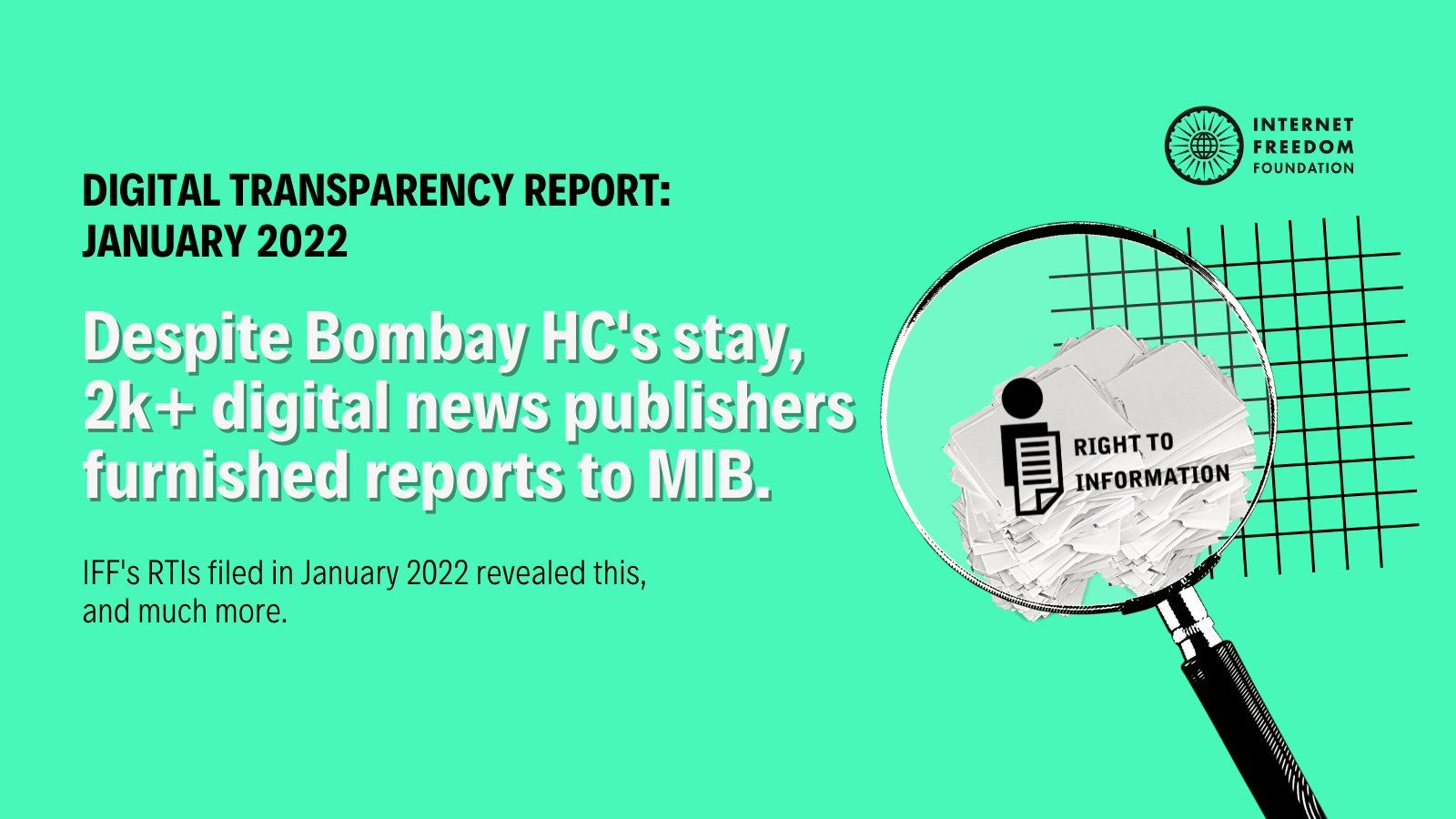
tl;dr
For the month of January 2022, IFF has filed 10 RTI requests and 2 first appeals. Responses from the Ministry of Information and Broadcasting on notices sent to about 2000 digital news publishers under the IT Rules, 2021 were widely covered in the press.
Data Protection and Privacy
One of our key areas of work is ensuring that public authorities respect data privacy and engage in practices that will ensure that the right to privacy is protected. We filed 9 RTI requests and 1 first appeal with various authorities this month to ask for information pertaining to newly introduced projects which affect the data privacy of Indian citizens.
Under IFF’s Project Panoptic, we routinely file RTI requests with various public authorities after we come across news reports that they are developing or using facial recognition technology (FRT). This month, we filed requests with:
- The Delhi Police on Facial Recognition Technology being used in the Republic Day celebrations.
- The Delhi Police on the use of evidence collected via facial recognition technology in the February 2020 Delhi Riots case.
For more information on the use of facial recognition technology and how it increases mass surveillance, visit IFF’s Project Panoptic.
Additionally, we also filed requests with:
- The Centre for Development of Advanced Computing on data breaches that occurred, and data and website vulnerabilities report in India from 2017-2021 and actions taken.
- The Department of Telecommunications on whether any representations were sought and stakeholders consulted for the extension of Call Data Retention by Unified Licensees to two years from the earlier one year.
- The Ministry of Agriculture and Farmer Welfare on the current status of India Digital Ecosystem of Agriculture pilot project, and feedback from stakeholders.
- The Ministry of Electronics and Information Technology on Aarogya Setu technical parameters, data protocol status, public repository update, etc.
- The Ministry of Electronics and Information Technology on stakeholders consulted for Digital Government Mission, and other file notings.
- The Ministry of Health and Family Welfare on data collected via CoWIN, data protocol, etc..
- The National Health Authority on data collected via CoWIN, data protocol, etc.
We also filed 1 First Appeal with the Department of Personnel & Training in their reply to our original RTI request dated 16/12/2021 on changes made to the RTI online portal. In their response, the PIO mentioned that the changes were carried out “to increase the response time and decrease the server load”. Link to our forum post on the replies received.
Free Speech and Censorship
Another focus of our work is to ensure that freedom of speech and expression on the internet is protected and that unnecessary censorship does not lead to a chilling effect on people’s fundamental rights. For this, we routinely file RTI requests to demand accountability for instances that may hamper free speech on the internet such as website blocking or internet shutdowns.
In the last month, we have filed 1 RTI request to demand accountability for violations of free speech on the internet with the National Internet Exchange of India on the notice to seek written approval of NIXI CEO on .in domain registrations.
We also filed one first appeal with the Ministry of Information and Broadcasting for their incomplete reply dated 14/01/2022 to our original reply requesting information on the list of publishers to whom communications were sent by the Ministry of Information and Broadcasting.
In a significant response, to our request for information dated 03/01/2022 to the Ministry of Information and Broadcasting, MIB admitted that it did indeed issue such notices - on 26.05.2021, and again on 09.09.2021. This is a surprising revelation, since the second notice dated 09.09.2021 was issued after the Bombay High Court’s stay on certain rules of the IT Rules 2021, which conferred authority on the MIB to regulate digital news media. Read our blogpost.
The responses received from our request for information were widely covered in the media on our request for information from the Ministry of Information and Broadcasting. We sought information on notices issued to digital news publishers by the ministry, despite interim orders by the Madras and Bombay High Courts staying the operation of the three-tier grievance redressal mechanism and the Code of Ethics. The responses were covered in NewsLaundry, The Wire, Times Now, Exchange4Media, Times of India, Scroll, and Medianama.
Why is transparency important?
The Right to Information Act, 2005 was enacted to promote transparency and accountability in the working of every public authority by ensuring that citizens are able secure access to information under the control of public authorities. Facilitating such access is necessary to ensure that democratic processes are not subverted by public authorities acting under private interests. Where transparency is not upheld as a value of public decision-making, citizens are at a disadvantage when it comes to keeping a check on abuse of power by the public authorities.
The Right to Information (RTI) Act is thus one of the most important tools at the disposal of the public to engage with, and demand transparency and accountability from, the Government. We use the Act to routinely extract information about various ongoing policies and projects that the Government launches.
Important Documents
- Digital Transparency: A Right to Information report for December 2021 dated January 04, 2022. (Link)
The post was drafted with the assistance of Gyan Tripathi, a fourth-year law student from Symbiosis International (Deemed University), Pune, and reviewed by IFF staffer Anushka Jain.

